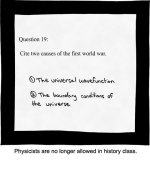This is a subject I've though about many times. Aquinus has told us that "there must be a first cause", otherwise the universe cannot exist. I know this argument has been refuted before, but perhaps there's another way to do so.
Consider this. There is a car crash. This is caused by the following causes: cars exist. Roads exist. People being inattentive exist. Etc etc. The crash causes lots of things to happen: people get injured. People are late for work. People's work doesn't get done. Ambulance drivers and doctors have jobs. etc etc
So in everyday life, there is no one cause of everything. Causes make things happen, but they very often branch off and cause other things to happen, and some of these things that happen combine with other unrelated causes and thus cause yet more things to happen, endlessly branching off and combining into infinity. This is a web of causality, not a linear line of this causes that and then something else with no direct contributions from anything else.
If there is this web of causality, then how do we deduce from that assumption that there is a single and first cause of it all? It doesn't fit with the complex web of intersecting and branching causes suggested above. Going back in time possibly makes the web smaller... but it doesn't shrink it to a linear sequence of causes and events.
So perhaps the best we can say is that there are multiple, independent first causes. That's not a single creator God.
Consider this. There is a car crash. This is caused by the following causes: cars exist. Roads exist. People being inattentive exist. Etc etc. The crash causes lots of things to happen: people get injured. People are late for work. People's work doesn't get done. Ambulance drivers and doctors have jobs. etc etc
So in everyday life, there is no one cause of everything. Causes make things happen, but they very often branch off and cause other things to happen, and some of these things that happen combine with other unrelated causes and thus cause yet more things to happen, endlessly branching off and combining into infinity. This is a web of causality, not a linear line of this causes that and then something else with no direct contributions from anything else.
If there is this web of causality, then how do we deduce from that assumption that there is a single and first cause of it all? It doesn't fit with the complex web of intersecting and branching causes suggested above. Going back in time possibly makes the web smaller... but it doesn't shrink it to a linear sequence of causes and events.
So perhaps the best we can say is that there are multiple, independent first causes. That's not a single creator God.

